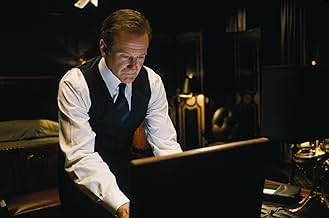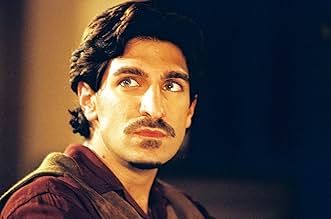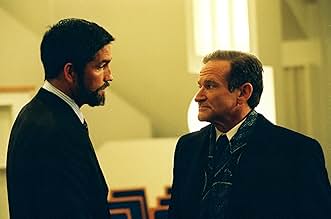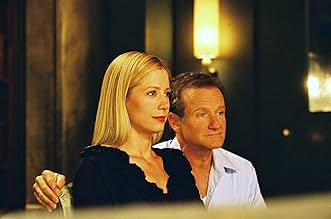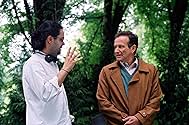IMDb RATING
6.1/10
35K
YOUR RATING
Set in a world with memory recording implants, Alan Hakman is a cutter, someone with the power of final edit over people's recorded histories. His latest assignment is one that puts him in d... Read allSet in a world with memory recording implants, Alan Hakman is a cutter, someone with the power of final edit over people's recorded histories. His latest assignment is one that puts him in danger.Set in a world with memory recording implants, Alan Hakman is a cutter, someone with the power of final edit over people's recorded histories. His latest assignment is one that puts him in danger.
- Awards
- 1 win & 4 nominations total
Tarek Bishara
- Hasan
- (as Thom Bishops)
- Director
- Writer
- All cast & crew
- Production, box office & more at IMDbPro
Featured reviews
The plot is timely and intriguing, providing lots of food for thought as to the perhaps not-too-far future prospects of technology and our own legacies.
I agree the relationship between Williams' character and his love interest was too sketchy. With a few extra minutes expanding on those two, the film might have been more fleshed out. Overall, I enjoyed the movie. It really gave us pause to reflect on the pros and cons of the "Zoe Implant" and "rememories." Appreciated the intense acting abilities of Williams and Caviezel; otherwise, the movie might have lagged even more.
I thought the angles of the camera shots were interesting.
I agree the relationship between Williams' character and his love interest was too sketchy. With a few extra minutes expanding on those two, the film might have been more fleshed out. Overall, I enjoyed the movie. It really gave us pause to reflect on the pros and cons of the "Zoe Implant" and "rememories." Appreciated the intense acting abilities of Williams and Caviezel; otherwise, the movie might have lagged even more.
I thought the angles of the camera shots were interesting.
I don't completely understand the negative reviews of this film because I thought films (except for documentaries) legitimately use the "willfull suspension of disbelief" to accomplish their goals of entertainment. Granted, not everything in this film makes perfect logical sense and could have been written just a little better (or maybe suffers the fate of all literature to film shortcomings) but I absorbed the film as a morality/ethics dilemma rather than a logical tale of facts and relationships. I do concede the ending left me a little wanting for resolution.
Good questions were touched upon in a less than preachy head slap because of the low key acting presentations. And Williams has always held my attention in any of his work to date. This one is worth watching if you're not a detail critic, though it's not as badly crafted as some would make it seem.
Good questions were touched upon in a less than preachy head slap because of the low key acting presentations. And Williams has always held my attention in any of his work to date. This one is worth watching if you're not a detail critic, though it's not as badly crafted as some would make it seem.
Well, I just saw The Final Cut over the weekend and I am finding myself very disappointed in the movie. From the previews I had imagined something a little different with a lot more action that what took place. There were certain scenes that I felt were good and like them, but all in all I would rather have waited to just rent the movie than to have gone to see it in the theaters. It was a pretty slow moving movie when I was expecting more suspense and action. Robin Williams did a great job in the part, just to clarify. Once again, it was just my view of the movie as a whole that I did not like. The overall plot was good and the storyline had a great theme but as I watched, I just became more and more disappointed. Then at the end, it just kind of ended. To me, I was left with the feeling that there should have been more than just a sudden ending like it had.
Set during an unspecified future era, or perhaps an "alternate universe" present era, The Final Cut posits a world in which "first person viewpoint" computer chip implants are possible for those who can afford it. These record a person's entire life from a first person viewpoint--the "camera" sees what the person sees, hears what they hear. The intention is to have an accurate, documentary-like record after the person dies. These are presented as films at their funerals. Citizens known as "cutters" (just a slang for a film editor) pare down one's life to a feature length presentation. There are also those who protest the implants. The Final Cut is the story of the latter days of a cutter, Alan W. Hakman (Robin Williams).
While The Final Cut is enjoyable enough, it has tremendous squandered potential. As one would expect, Williams turns in an incredible performance, but the script, by writer/director Omar Naim, could have used a lot of work.
The premise is fabulous. It opens many philosophical and psychological cans of worms. Some are dealt with, but only cursorily. Surely cutters go through a lot of emotional trauma as they vicariously experience the lows and the mundanities of other person's lives. Naim shows us this briefly with a recording of someone who was an abuser. But as soon as he shows us this material, he drops it. The film is advertised as a thriller. How much more exciting would it have been to embed Hakman in the middle of some grand, suspenseful plot, the details of which became known to him through data from an implant? As one of the opponents of the implant technology remarks, the implants have changed the way people relate to each other. That is a good point--it would have a profound impact on that. So why aren't we shown instances of this in the film? This could have been another hinge for a very intriguing, tense plot.
There are also issues of invasion of privacy, surveillance paranoia, consent (the implants are shown being put into infants and being permanent), and "misuse" of the data. Most of these are barely touched. Often they're only broached with a single comment, or a protester's sign.
Other fascinating issues brought up by the idea of the technology are not even mentioned. Surely, such technology would prove to be invaluable as evidence in crimes. And surely many people, especially victims, would voluntarily offer a "tap" into their implants so they can be witnesses. Why not comment on these kinds of possibilities? The Final Cut is also oddly understated with such a far-reaching sci-fi premise in this era of rubber reality films. A number of plot points, such as the one involving Louis Hunt, have almost disappointingly mundane resolutions. For that matter, for a sci-fi film set in the future or an alternate reality, there isn't much that is different about the world except for the implants. Probably the lack of differences was due to budget. It costs a lot of money to build alternate realities.
This might sound far too negative for the film to warrant a 7 out of 10 from me, which is equivalent to a "C" letter grade. Much of the film is saved by the performances. In combination with direction that is more often than not interesting and unusual, it's easy to focus on the promise of the premise rather than the unfulfilled extensions of the same.
Hakman, and presumably the other cutters, have odd dispositions. Their task is to make everyone look good--like a mortician making up a mangled body so it's "presentable" at a funeral. They spend hour upon hour as voyeurs. They are something like archivists, but also have to play detective. It makes them strangely aloof and dour. It's difficult for them to have relationships. Naim gets in a couple cracks that portray the cutters and their social relationships as similar to geeky "Internet addicts". This is all good stuff, and it's excellently played by Williams.
The flow of the film is a bit odd, and especially the ending (which I praised for its relative nihilism) is eventually abrupt in a way that doesn't exactly work (and I usually love abrupt endings). Being generous, we could take the wonky flow as a "level-removed" kind of self-reference. Of course Naim was faced with cutting the film to make it look good, but it's a bit awkward and arbitrary-feeling, just as a cutter's work would likely be when faced with having to produce a coherent 90-minute film out of 80 years' worth of material. Being less generous, Naim simply needs to learn how to better tell a story, and there was no intention of real-world reflexivity with his fictional material.
The Final Cut is worth seeing, especially if you're a Robin Williams fan as I am, but it's a disappointment considering what it could have been.
While The Final Cut is enjoyable enough, it has tremendous squandered potential. As one would expect, Williams turns in an incredible performance, but the script, by writer/director Omar Naim, could have used a lot of work.
The premise is fabulous. It opens many philosophical and psychological cans of worms. Some are dealt with, but only cursorily. Surely cutters go through a lot of emotional trauma as they vicariously experience the lows and the mundanities of other person's lives. Naim shows us this briefly with a recording of someone who was an abuser. But as soon as he shows us this material, he drops it. The film is advertised as a thriller. How much more exciting would it have been to embed Hakman in the middle of some grand, suspenseful plot, the details of which became known to him through data from an implant? As one of the opponents of the implant technology remarks, the implants have changed the way people relate to each other. That is a good point--it would have a profound impact on that. So why aren't we shown instances of this in the film? This could have been another hinge for a very intriguing, tense plot.
There are also issues of invasion of privacy, surveillance paranoia, consent (the implants are shown being put into infants and being permanent), and "misuse" of the data. Most of these are barely touched. Often they're only broached with a single comment, or a protester's sign.
Other fascinating issues brought up by the idea of the technology are not even mentioned. Surely, such technology would prove to be invaluable as evidence in crimes. And surely many people, especially victims, would voluntarily offer a "tap" into their implants so they can be witnesses. Why not comment on these kinds of possibilities? The Final Cut is also oddly understated with such a far-reaching sci-fi premise in this era of rubber reality films. A number of plot points, such as the one involving Louis Hunt, have almost disappointingly mundane resolutions. For that matter, for a sci-fi film set in the future or an alternate reality, there isn't much that is different about the world except for the implants. Probably the lack of differences was due to budget. It costs a lot of money to build alternate realities.
This might sound far too negative for the film to warrant a 7 out of 10 from me, which is equivalent to a "C" letter grade. Much of the film is saved by the performances. In combination with direction that is more often than not interesting and unusual, it's easy to focus on the promise of the premise rather than the unfulfilled extensions of the same.
Hakman, and presumably the other cutters, have odd dispositions. Their task is to make everyone look good--like a mortician making up a mangled body so it's "presentable" at a funeral. They spend hour upon hour as voyeurs. They are something like archivists, but also have to play detective. It makes them strangely aloof and dour. It's difficult for them to have relationships. Naim gets in a couple cracks that portray the cutters and their social relationships as similar to geeky "Internet addicts". This is all good stuff, and it's excellently played by Williams.
The flow of the film is a bit odd, and especially the ending (which I praised for its relative nihilism) is eventually abrupt in a way that doesn't exactly work (and I usually love abrupt endings). Being generous, we could take the wonky flow as a "level-removed" kind of self-reference. Of course Naim was faced with cutting the film to make it look good, but it's a bit awkward and arbitrary-feeling, just as a cutter's work would likely be when faced with having to produce a coherent 90-minute film out of 80 years' worth of material. Being less generous, Naim simply needs to learn how to better tell a story, and there was no intention of real-world reflexivity with his fictional material.
The Final Cut is worth seeing, especially if you're a Robin Williams fan as I am, but it's a disappointment considering what it could have been.
Set in a world with memory implants, Robin Williams plays a cutter, someone with the power of final edit over people's recorded histories. His latest assignment is one that puts him in danger.
While this is an interesting science fiction universe in and of itself, it also has an interesting message on surveillance and Neo-Luddism. While the idea of having your life on film for future generations may sound pleasant (or horrible), it puts everyone in the path of a camera -- anyone who looks at you may be recording your every move.
This is an idea that is thoughtful and well-presented. Maybe they could have explored the theme more, and it might even be worth returning to this universe in a future film...
While this is an interesting science fiction universe in and of itself, it also has an interesting message on surveillance and Neo-Luddism. While the idea of having your life on film for future generations may sound pleasant (or horrible), it puts everyone in the path of a camera -- anyone who looks at you may be recording your every move.
This is an idea that is thoughtful and well-presented. Maybe they could have explored the theme more, and it might even be worth returning to this universe in a future film...
Did you know
- TriviaThe Zoe implant records all visual experiences in a person's life. In Greek, Zoe means "life".
- GoofsThe paper announcing Bannister's death states that he was 54 when he died. But, when Alan loads his implant for the first time, it states that there are 544,628 life hours to review. That number of hours would make him over 62 years of age.
- Soundtracks4 Seasons/Spring
(1725)
Written and Composed by Antonio Vivaldi (as Vivaldi)
Performed by Royal Philharmonic Orchestra (as The Royal Philharmonic)
Published by Extreme Music Library PLC
Courtesy of Extreme Production Music
- How long is The Final Cut?Powered by Alexa
Details
- Release date
- Countries of origin
- Official site
- Language
- Also known as
- Más allá de la muerte
- Filming locations
- Production companies
- See more company credits at IMDbPro
Box office
- Gross US & Canada
- $551,281
- Opening weekend US & Canada
- $226,296
- Oct 17, 2004
- Gross worldwide
- $3,222,439
- Runtime1 hour 35 minutes
- Color
- Sound mix
- Aspect ratio
- 2.35 : 1
Contribute to this page
Suggest an edit or add missing content


